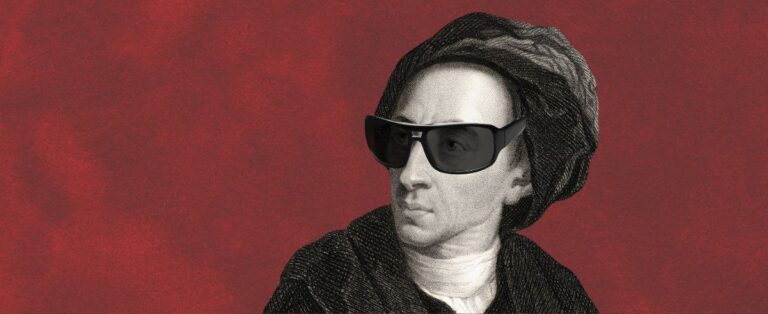“make It New… Again.” Why We Need Alexander Pope’s Wild, Weird Poetry Today

Alexander Pope is hardly an unknown quantity. Born in London to a family of merchants in 1688 and buried in a Catholic Church in the suburb of Twickenham in 1744, he has a metaphorical statue in the pantheon of great English poets extending from Chaucer to Auden, and an actual memorial in the Poets’ Corner of Westminster Abbey.
Along with his friends John Swift, author of Gulliver’s Travels, and John Gay, author of The Beggars’ Opera, he defined English culture in the decades leading up to the Industrial Revolution, during what is now called the Augustan era, named after one of his poems.
Pope’s publishing strategy for his idiosyncratic translation of Homer’s Iliad was the first to make the cross-over from a feudal patronage system to the literary marketplace that readers and writers, for better or worse, operate in today. Not so long ago, he was one of the more frequently represented authors in anthologies like Bartlett’s Familiar Quotations.
Have you ever damned with faint praise? Said that fools rush in where angels fear to tread? Acknowledged that a little learning is a dangerous thing, or that to err is human, but to forgive, divine? You may not know it, but you were quoting Pope.
And there, to quote a different English poet, is the rub. Pope’s major works—the verse essays on “Criticism” and “Man,” the mock-satires The Rape of the Lock and The Dunciad—are all classics in Mark Twain’s sense: things everyone wants to have read and no one wants to read. Perhaps that’s even too generous to his current reputation. John Mullan, a specialist in eighteenth century English literature at University College London, says The Dunciad “has a good claim to be the greatest unread poem in the language.”
John Mullan, a specialist in eighteenth-century English literature at University College London, says The Dunciad “has a good claim to be the greatest unread poem in the language.”It is easy to see why Pope does not resonate with contemporary Anglophone readers, even that particularly devoted group who remain invested in that once central form, poetry. His use of heroic couplets sounds artificial, pompous, and even corny to ears trained on a century and a half of free verse lyric. The mock-epic has gone the way of mock turtle soup; essay and satire are genres we today tend to think ought to be handled in prose, not rhyming verse.
In the quarrel between the ancients and moderns—a sort of ideological forerunner to our debates about the enlightenment and the counter-enlightenment—Pope took the side of the ancients, and lost; his pervasive references to and pastiches of classical literature and mythology read as more antiquated than the originals.
To make matters worse, The Dunciad requires an unusual amount of historical context to understand, since Pope’s vicious and bawdy satire of London intellectual and political life, scandalous in its own day, was so successful in demolishing the reputation of most of its targets that their memory survives only in scholarly footnotes to the poem itself. T.S. Eliot’s “The Waste Land” and Vladimir Nabokov’s Pale Fire are unthinkable without The Dunciad, but the poem nonetheless seems further from us than, say, the “Holy Sonnets” of John Donne, which were published a little under a century before.
Pope’s masterpiece was born of the union of a number of grudges. As a Catholic, then a persecuted religious minority, who contracted Potts’ disease in youth, leaving him hunchbacked and in constant pain, Pope was a double-outsider in eighteenth-century England. His improbable rise to literary fame under Queen Anne was followed by a reversal of fortune after her death in 1714, the ascension of George I of Hanover, and the dispersal of the Scriblerus Club, the small coterie of writers, including Swift and Gay, he belonged to.
In 1726, the writer, translator, and scholar Lewis Theobald pilloried his edition of Shakespeare in a book called Shakespeare Restored. The book’s subtitle—Or, A Specimen of the Many Errors, As Well Committed, As Unamended, by Mr. Pope, In his Late Edition of this Poet—succinctly captures Theobald’s criticisms, and allows us to imagine Pope’s embarrassment at them.
Two years later, he struck back with an anonymous, three-book poem whose protagonist is a certain pedant named “Tibbald” appointed by the Goddess of “Dulness” to the throne of the Kingdom of Dunces. If epic celebrates ancient deeds of extraordinary virtue and heroism, mock-epic uses the same narrative set pieces to satirize the all-too-human vices of contemporary pettiness, vanity, stupidity, and greed.
In the second book of The Dunciad, for example, the Goddess of Dulness stages games, on the model of the Iliad, in which publishers have a literal pissing contest, and the hack writers of grub street compete to see who can dive deepest into Fleet Ditch, London’s sewer. In the third book, Tibbald voyages to the underworld, on the model of the Aeneid, where the shade of his predecessor introduces him to the dunces of his realm. Pope takes shots at everyone, from theater directors and critics—then as now, the bane of the literary world—to the Prime Minister and King.
The Dunciad caused an immediate stir. Keys to the poem were published revealing the figures Pope had disguised with pseudonyms or hid behind initials. The offended parties wrote their own satirical attacks on Pope, and spread rumors about him in the press.
He had good reason to fear for his physical safety. Pope might have left well enough alone; instead, he revised and expanded the poem for the next fifteen years, alongside more edifying work like his Moral Essays, which he did not live to complete.
The ethos of “make it new” has given way to the ethos of craft and the standardizations of professionalism.A year before his death, a final version of The Dunciad appeared. Pope changed the “hero” from Theobald to the playwright and Poet Laureate Colley Cibber (dunces being fundamentally interchangeable). He added a fourth book which took on universities, scientists, and philosophers, and, in a parody of academic commentary, tricked out the whole with prefaces, introductions, and footnotes attributed to his friends in the Scriblerus Club.
The ribaldry of the earlier versions gave way to a darker, more despairing vision of the future of English culture. It concludes on the following note:
See Mystery to Mathematics fly!
In vain! They gaze, turn giddy, rave, and die.
Religion blushing veils her sacred fires,
And unawares Morality expires.
Nor public flame, nor private, dares to shine;
Nor human spork is left, nor glimpse divine!
Lo! They dread empire, CHAOS! is restored;
Light dies before thy uncreating word:
They hand, great Anarch! lets the curtain fall;
And universal darkness buries all.
Once considered the gold standard of formal elegance, Pope’s poetry now seems totally bizarre. That is precisely what I like about it. To read The Dunciad in the twenty-first century is ask oneself: why on earth would anyone write like this? And to ask that question is to be immediately confronted by another: why don’t we write this way anymore?
The long answer would require a book, but a short one could probably be boiled down to two words: William Wordsworth. Despite the disruptive estrangements and complex novelties of modernism and postmodern poetry, most contemporary Anglophone verse operates according to the aesthetic norms first laid out in the preface to his and Coleridge’s 1798 collection Lyrical Ballads: the centrality of “natural” diction, the genre of lyric, the image and trope as device, and the personal experience of emotion as subject matter.
The ethos of “make it new” has given way to the ethos of craft and the standardizations of professionalism, marginalizing some of the effects that were still alive in the writing of what I like to call the “weird eighteenth century”: artificiality, rhetoric, impersonality, humor, paratextual and intertextual play.
Pope still has much to say to us. After all, our literary world—with its new publishing platforms, its insatiable demand for a cheap supply of the written word, its cutthroat competition on the open market, its proliferation of critics and coteries, its devotion to the topical, its anxieties about authenticity and anonymity—and our political world—stained by corruption, commerce, and buffoonish stupidity—rhymes with the one that inspired him to write The Dunciad.
Perhaps, as Walter Benjamin once suggested, the poetry of the future will only become visible when we fan the embers of those possibilities burning low in the ashes of the past.
______________________________
Context Collapse: A Poem Containing a History of Poetry by Ryan Ruby is available via Seven Stories Press.

